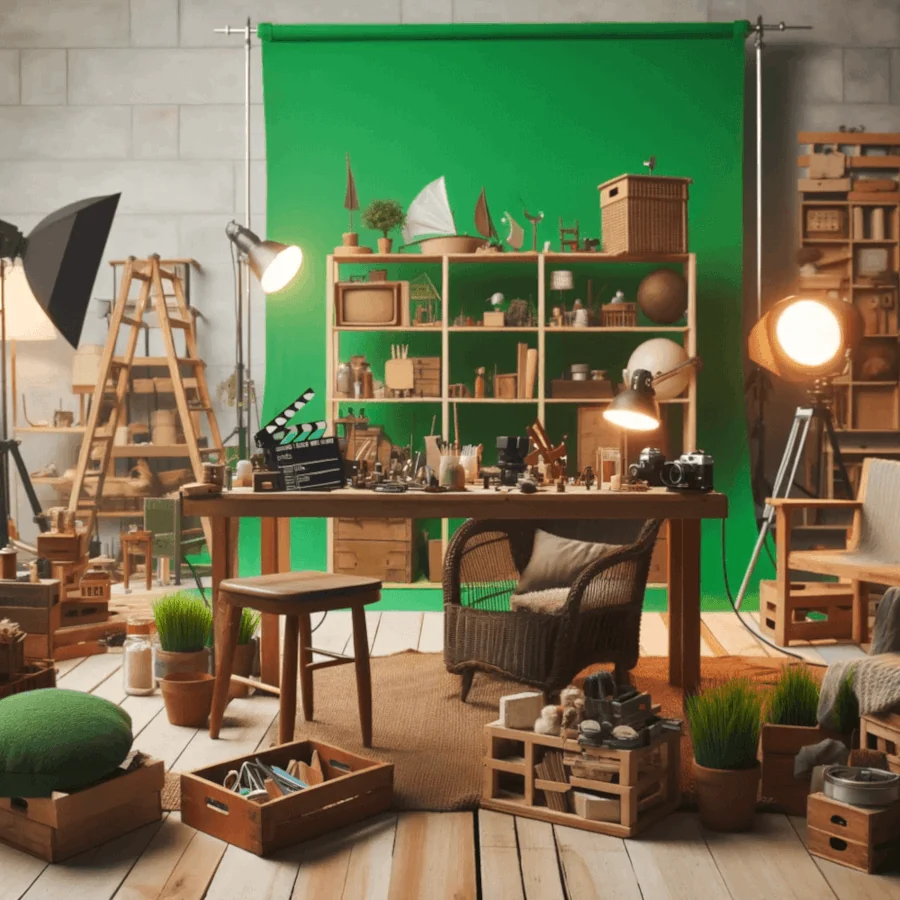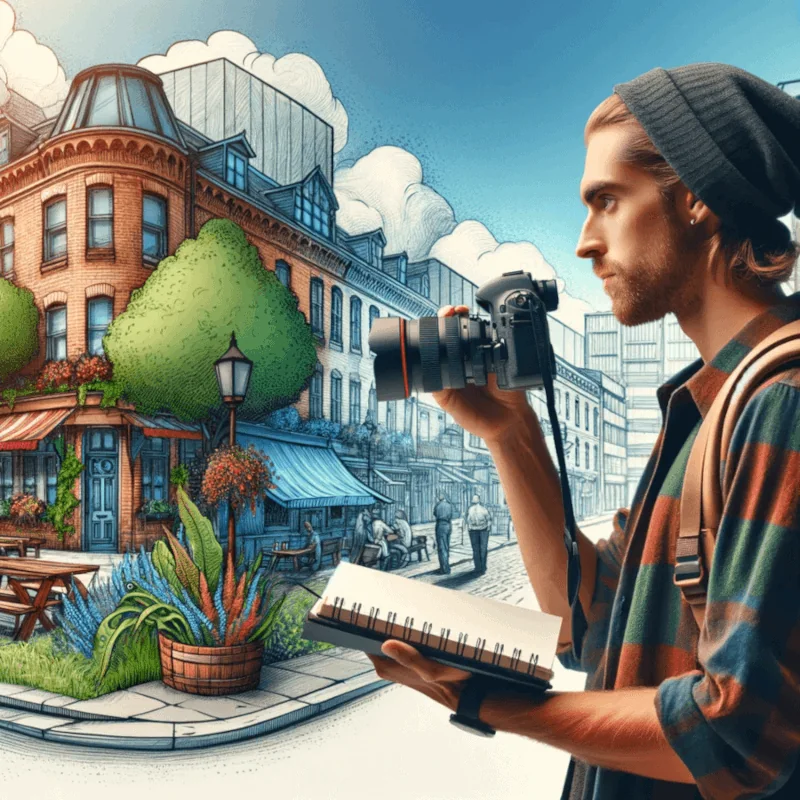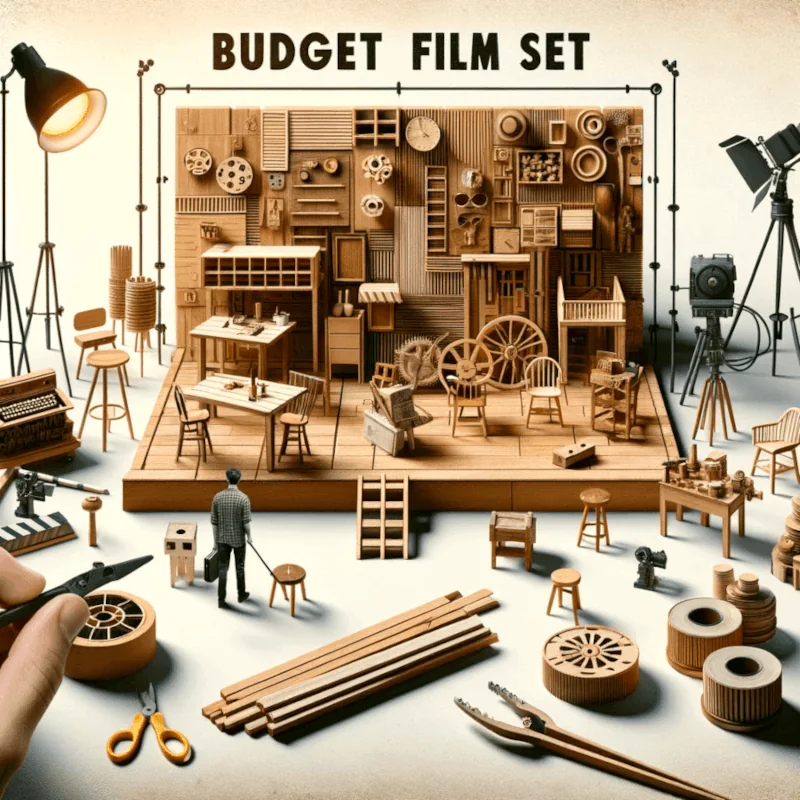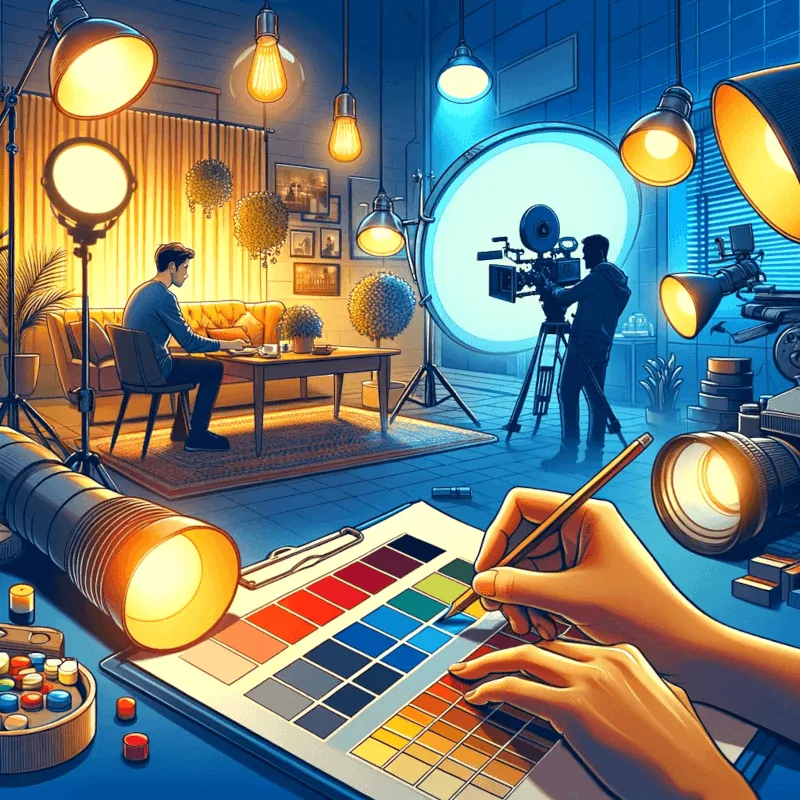Unlock the secrets of budget filmmaking with essential production design tips for visually rich storytelling.
Key Takeaways
- Efficient use of limited resources for maximum visual impact.
- Smart location scouting to reduce costs.
- DIY techniques for set and costume design to maintain aesthetic appeal.
- Implementing cost-effective lighting and color strategies to enhance mood and atmosphere.
Ways to Maximize Resources for Budget Filmmaking
In budget filmmaking, the adage “necessity is the mother of invention” couldn’t be truer, especially in production design. Here, creativity is not just an asset; it’s a requirement. Below are some innovative ways to stretch your budget while maintaining the quality and aesthetic of your film.

1. Leverage Local Resources
Start by exploring your local community. Often, you’ll find hidden gems like vintage stores, antique shops, and thrift stores offering unique props and set pieces at a fraction of the cost. Building relationships with local business owners can also lead to borrowing or renting items for a minimal fee.
2. Repurpose and Recycle
Before buying new, see what you already have at your disposal. Old furniture, fabrics, and even everyday objects can be repurposed to fit your set. This not only saves money but also adds a layer of authenticity and uniqueness to your production design.
3. Digital Magic
In the digital age, technology can be a budget filmmaker’s best friend. Use digital backdrops or green screens to create environments that would otherwise be costly to build or travel to. Software solutions can offer high-quality results without breaking the bank.
4. Simplicity is Key
Sometimes, less is more. Opt for minimalist designs that require fewer elements. This approach can lead to a more focused and intense atmosphere, drawing the audience’s attention to the storyline and characters rather than elaborate sets.
By implementing these strategies, you can significantly reduce costs while still achieving a visually rich production design. The key is to be resourceful, innovative, and open to unconventional methods that bring your cinematic vision to life within your budget constraints.
What are key production design tips for budget filmmaking?
Essential tips include leveraging local resources, repurposing materials, using digital solutions, simplifying designs, strategic location scouting, DIY set building, cost-effective costume and prop sourcing, and employing budget-friendly lighting and color schemes.
How to Scout Locations on a Budget
Location scouting is a pivotal aspect of production design, particularly in budget filmmaking. The right location not only provides a suitable backdrop for your story but can also significantly reduce set design costs. Here’s how to find affordable yet effective settings:

1. Utilize Public Spaces
Public parks, streets, and buildings often require little to no fees for filming. These places offer natural settings that can add authenticity to your film. Ensure you check with local authorities about any permits or restrictions.
2. Private Properties
Sometimes, private properties offer the perfect setting for a scene. Don’t hesitate to reach out to owners. Many are open to negotiation, especially if they understand the artistic value or get a chance to see their property on screen.
3. Look for Multifunctional Spaces
Select locations that can serve multiple purposes within your film. A versatile space can be redressed to represent different settings, saving both time and money.
4. Scout for Natural Beauty
Nature’s backdrops are free and visually stunning. Whether it’s a beach, forest, or urban landscape, natural environments provide a rich setting with minimal need for alteration.
By being strategic in your location scouting, you can find spots that are not only cost-effective but also enhance the visual storytelling of your film.
Tips for low budget filmmaking
DIY set design is a cornerstone of budget filmmaking, offering a cost-effective way to create a compelling visual narrative. Here are some key tips to build your vision while keeping costs low:

1. Plan Thoroughly
Before you start building, plan your set in detail. Sketch out designs, list materials needed, and determine how you can create the desired look for less. Good planning can prevent costly mistakes and unnecessary purchases.
2. Recycle and Upcycle
Scour for materials that can be recycled or upcycled. Old furniture, fabrics, and construction materials can be transformed into set pieces. Think creatively about how you can alter these items to fit your theme.
3. Leverage Community Resources
Engage with your local community for resources. Local theater groups, schools, or other filmmakers may have props and set pieces you can borrow or rent at a low cost.
4. Build Modular Sets
Design sets that are modular and reusable. This approach allows you to rearrange components to create different scenes and settings, maximizing the utility of each piece.
5. Focus on Key Elements
Instead of building an entire set, focus on key elements that capture the essence of the scene. A well-placed piece of furniture or a distinctive backdrop can effectively convey the setting without the need for a full set.
By embracing DIY set design, you not only save money but also add a unique touch to your film.
How to Choose Costumes on a Budget
Costumes and props are essential in bringing a film’s characters and story to life. For budget filmmakers, making economic choices without compromising the story’s integrity is key. Here’s how to achieve that:
1. Thrift Stores and Garage Sales
These are treasure troves for budget filmmakers. You can find a variety of costumes and props that add authenticity to your film at a low cost. Look for items that can be easily modified or repurposed.
2. Borrow and Barter
Reach out to your network to borrow costumes and props. You might be surprised by what’s available in your community. In return, offer to credit the lenders in your film or provide other services.
3. Create and Customize
Basic sewing and crafting skills can go a long way. Customize simple garments to create the desired look. Use fabric paint, dye, or add embellishments to give costumes a unique flair.
With these strategies, you can create effective and memorable costumes and props that resonate with your audience and serve your narrative, all while maintaining a tight budget.
Lighting and Color Scheme on a Budget
Effective lighting and thoughtful color schemes are pivotal in setting the right mood and tone for your film, even on a tight budget. Here are some tips to achieve this without overspending:

1. Utilize Natural Light
Make the most of natural lighting. Shooting during the ‘golden hour,’ just after sunrise or before sunset, can provide your film with a beautiful, natural glow that’s hard to replicate artificially.
2. DIY Lighting Solutions
Get creative with DIY lighting. Use household lamps, LED strips, or even Christmas lights to create interesting lighting effects. Diffuse light using everyday materials like shower curtains or parchment paper.
3. Color Psychology
Use color to evoke emotions and set the tone of your film. Wardrobes, props, and set pieces in specific color palettes can significantly impact the mood without costing much.
4. Reflectors and Bouncers
Use simple reflectors to enhance natural or artificial light. A piece of white cardboard or a reflective fabric can be used to direct light exactly where it’s needed.
5. Renting Equipment
When you do need professional lighting, consider renting equipment instead of buying. Many rental houses offer affordable options for independent filmmakers.
By using these tips, you can create visually stunning scenes that resonate emotionally with your audience, proving that effective lighting and color schemes don’t have to drain your budget.
Parting Thoughts
Embracing budget filmmaking doesn’t mean compromising on quality. Creativity and resourcefulness are your greatest assets. From maximizing local resources to making smart choices in lighting and color schemes, each tip we’ve discussed offers a way to enhance your film’s production design without stretching your finances. By applying these practical tips, you’re not just saving money; you’re also starting your journey as a creative filmmaker. So, take these tips, apply your creativity, and prepare to impress your audience with a film that’s rich in visual storytelling, all achieved within a budget.
About RFM
RFM is a web-based video, TV, and film production management software that offers various features for professionals in the entertainment industry. It allows users to write professional project briefs and descriptions, talent, and actor showcases, visualize scenes with shot lists, media sharing and manage various aspects of production, including call sheets, shooting schedules, and script breakdowns. RFM is designed to help teams collaborate more effectively during the production process, making it a valuable tool for filmmakers, photographers, and video production companies